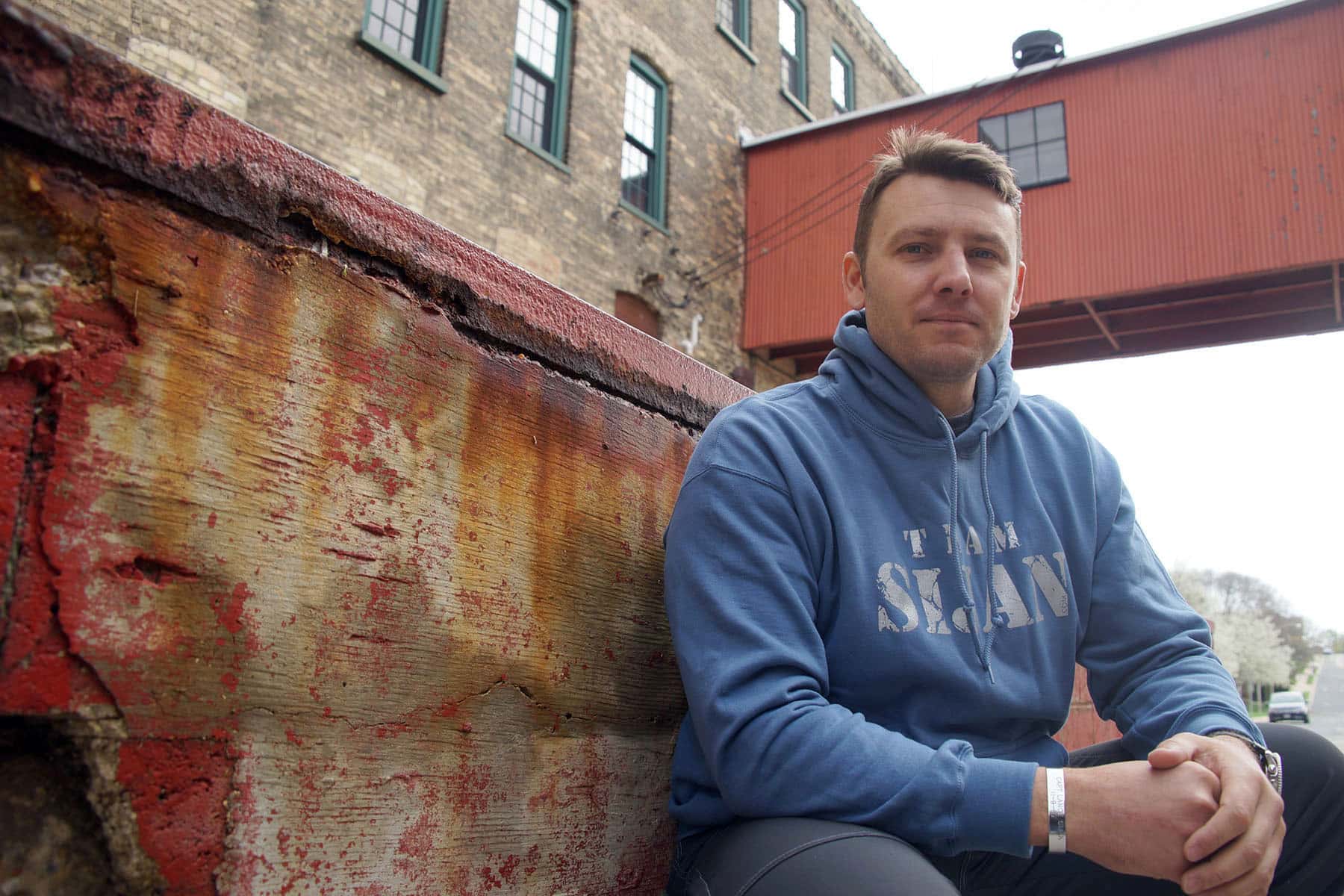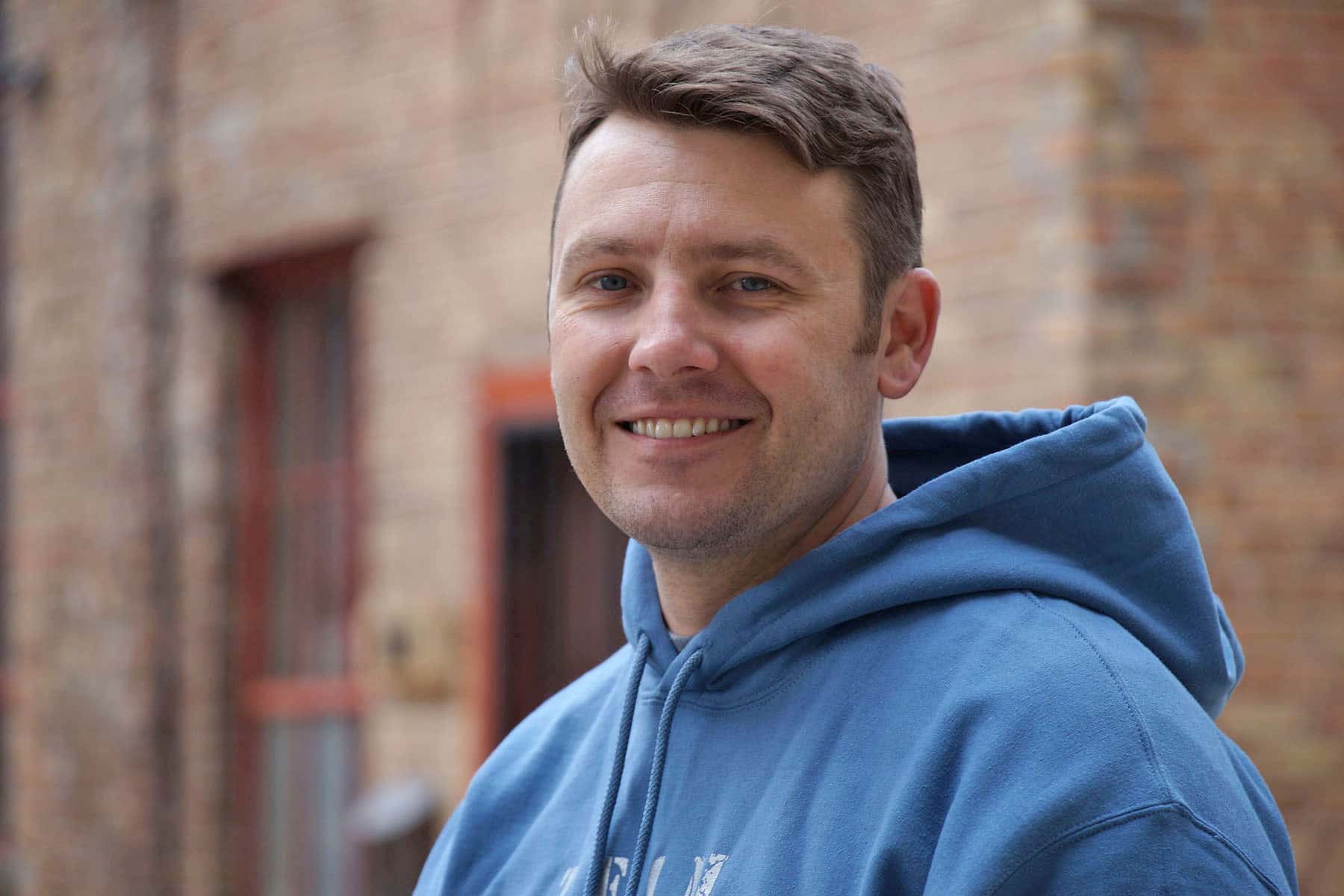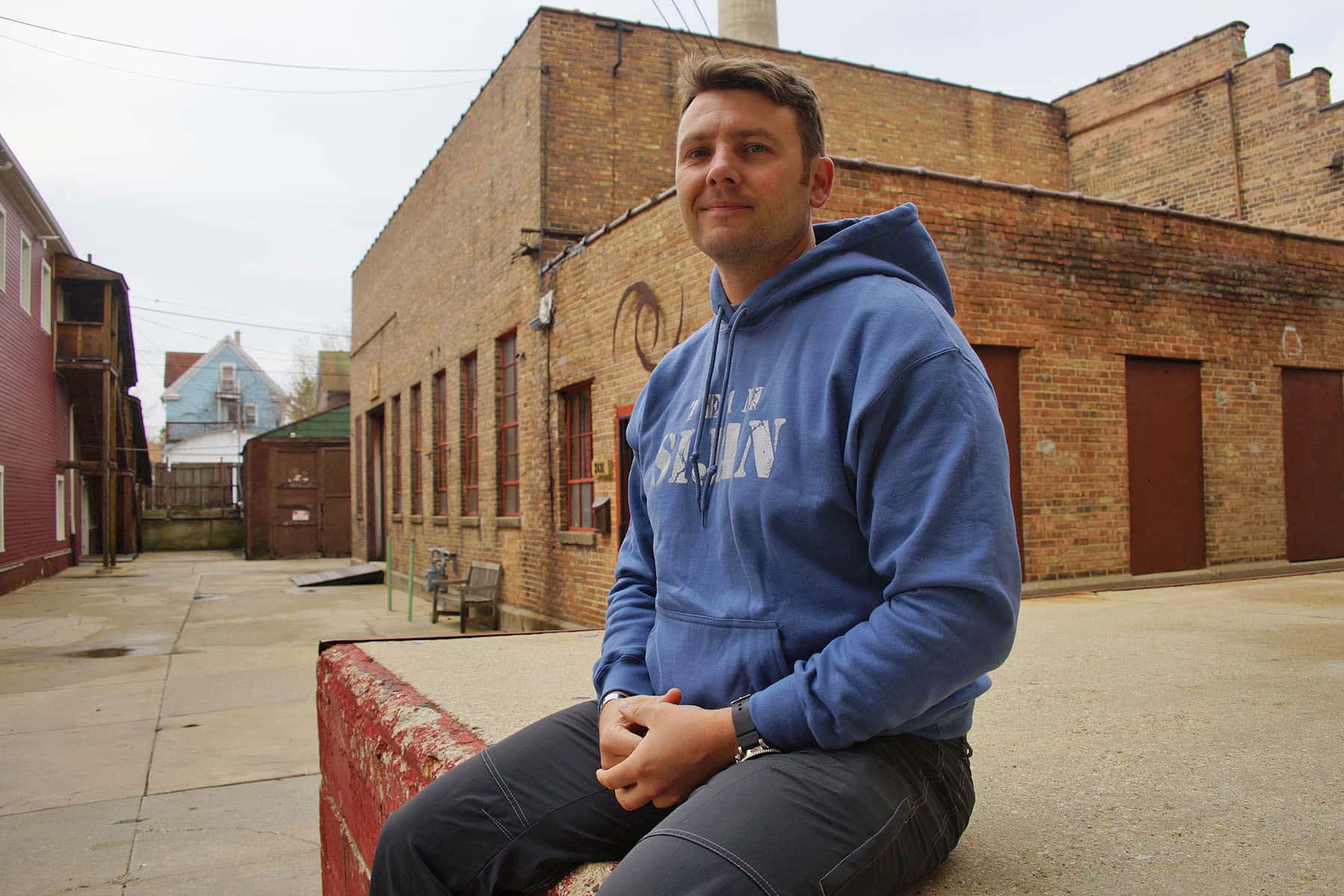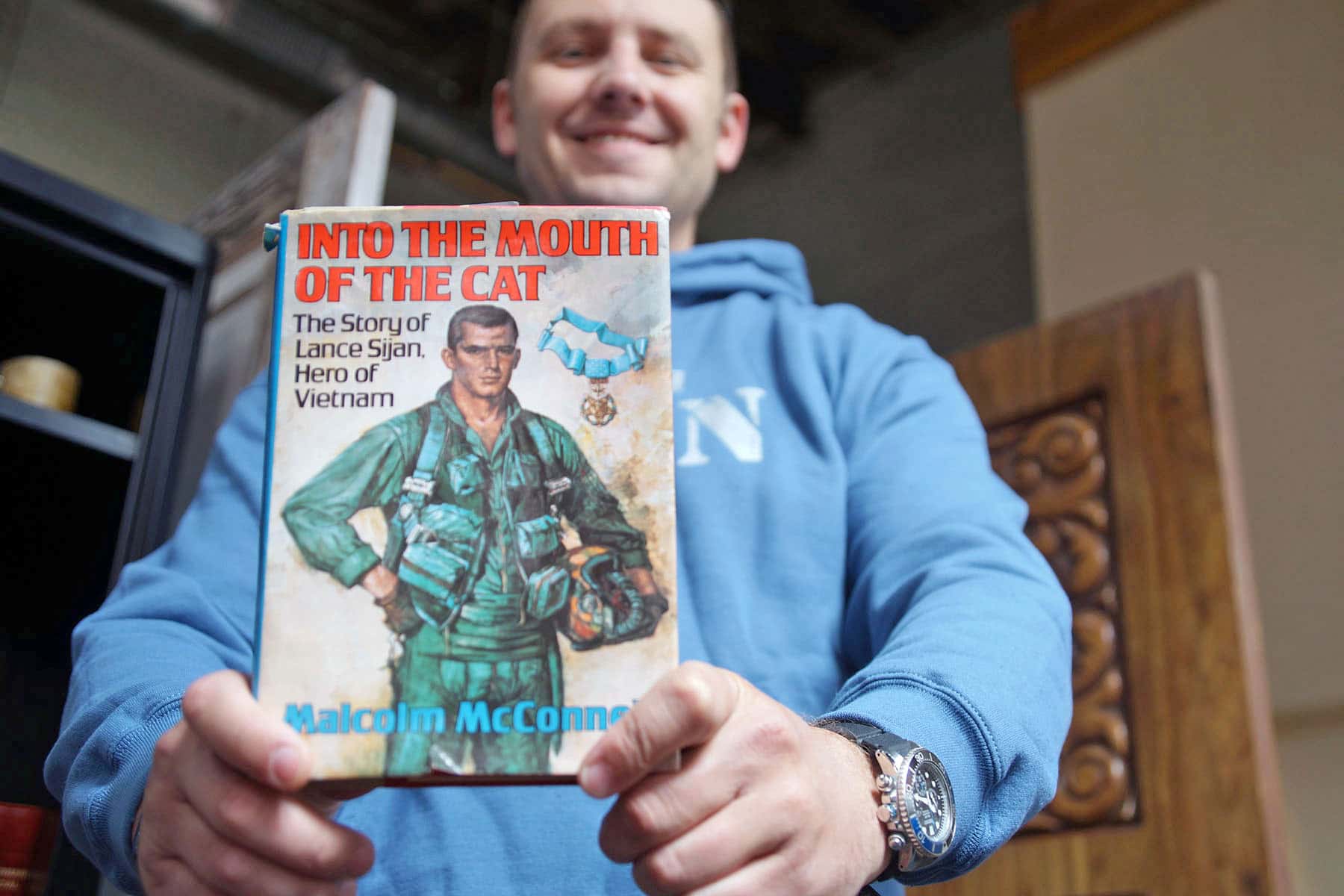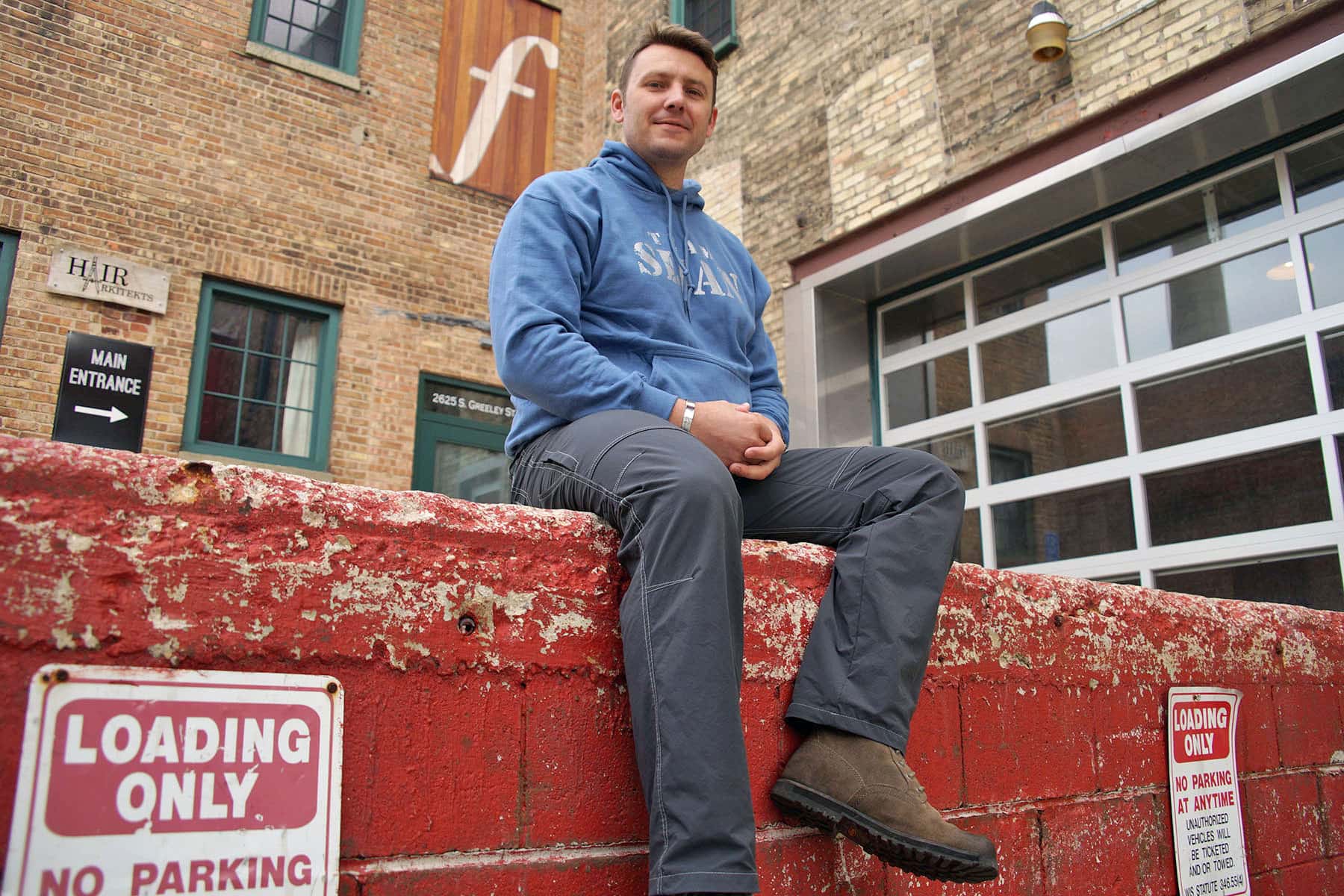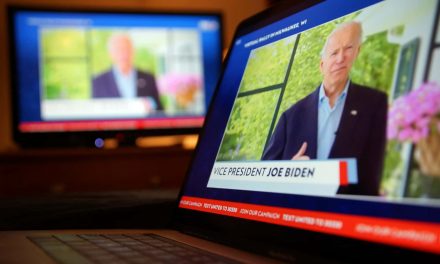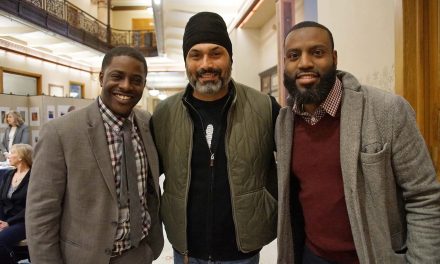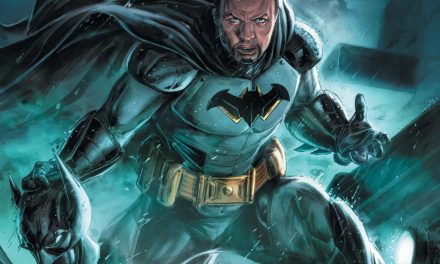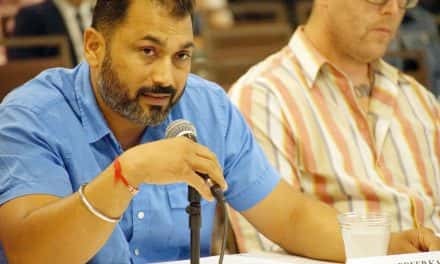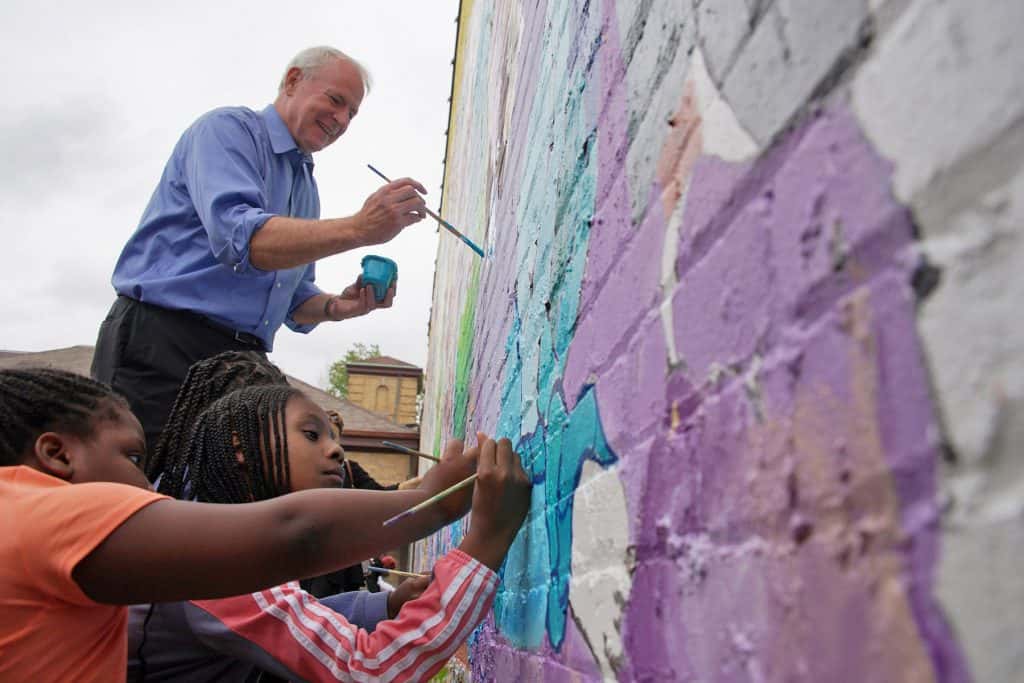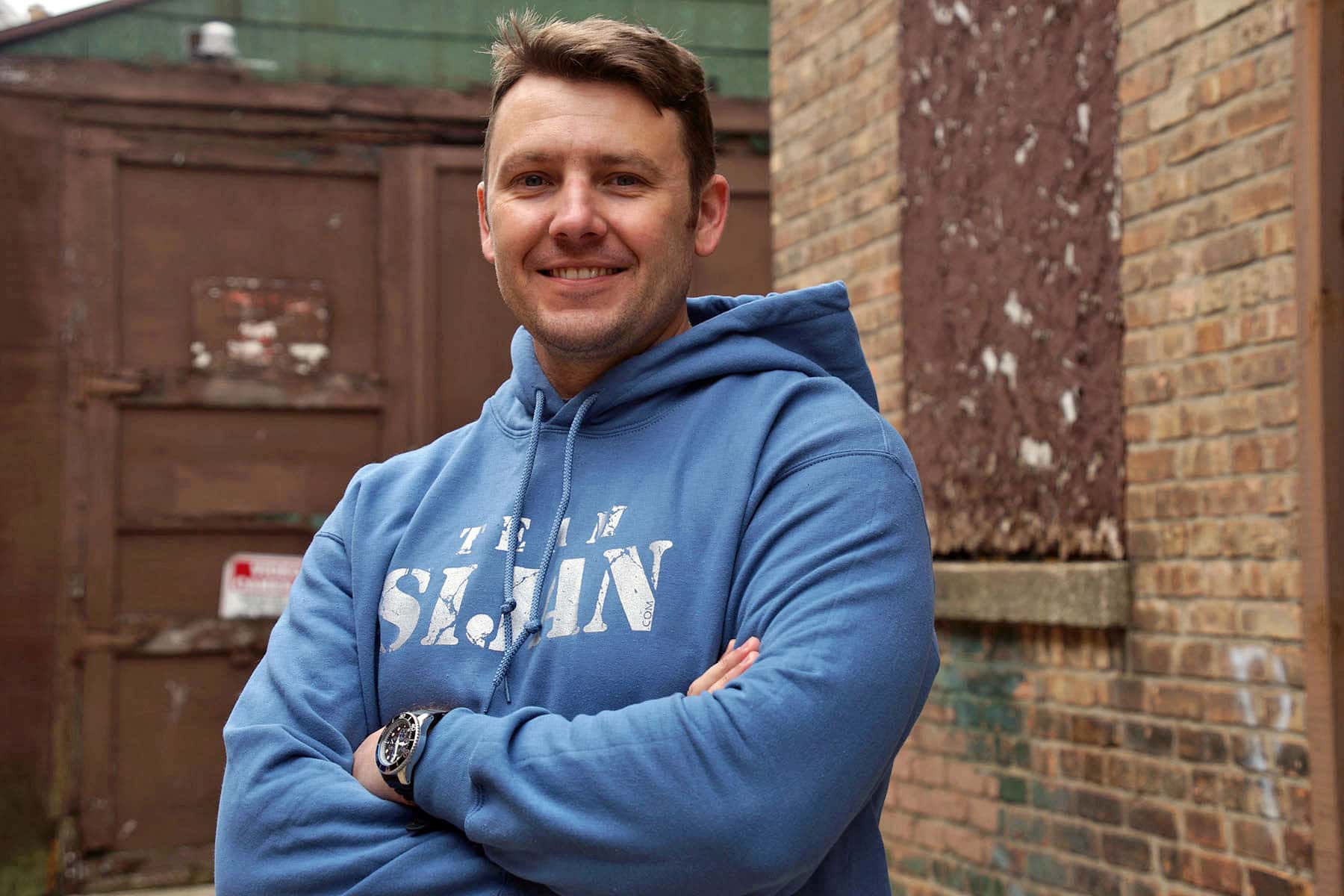
What the general public saw when they watched the reality TV show “Kicking & Screaming” was a handful of survival experts and non-experts paired together to overcome the challenges of tropical Fiji. What they likely missed was the true patriotic character of one participant, Ben Domian, his deep love for country as a third generation member of the Air Force, and a lifelong dedication to the legacy of his boyhood hero, fighter pilot Lance Sijan.
Lance Peter Sijan was born in Milwaukee in 1942 and graduated from Bay View High School in 1960. On March 4, 1976, he posthumously received the Medal of Honor, the highest military award in United States, for his selflessness and courage in the face of lethal danger.
The Milwaukee Independent sat down with Ben Domian when he was in Milwaukee for a visit to talk about his experiences, and how the story of Sijan influenced his life.
Q&A with Ben Domian
“I don’t think there is a better example of a patriot and a great American than Lance Sijan.”
Milwaukee Independent: Who was Lance P. Sijan and how do you tell his story when you visit classrooms of young children?
Ben Domian: Lance Sijan was a young man from Milwaukee. He went to the United States Air Force Academy and played football there. When Lance graduated, he immediately went to flight training, and then started flying missions over Vietnam.
On his 52nd mission as he was about to drop his ordinance, a faulty bomb in his payload exploded the plane. He had to eject, and his backseater dіеd that day. Lance came down into the jungle with enemy all around. He was just about the bomb them, so they were looking for him.
He landed with a fractured skull, a compound fracture of his leg, and a mangled right hand. So he landed and immediately had to start evading and surviving. He had almost no survival gear with him. In this poor physical condition, as banged up as he was, Lance spent 46 days crawling across the ground. That particular ground was extremely rough, so every every inch that he slid his body across, the ground was just tearing into his flesh.
He lost a lot of weight and became emaciated in the jungle. Then Lance was captured. He was able to escape that holding cell, but was recaptured and taken to a more permanent facility. It was known as the Hanoi Hilton. He was interrogated at length, and tortured, but he never gave any information. A lot of people would make up stuff but he never gave any information, just his name, rank, and serial number.
In his weakened state he got pneumonia and passed away in Hanoi. When his body was returned to the States, and the story came out of what he did, he was awarded the Medal of Honor. Lance Sijan is the only Air Force Academy graduate that has received our nation’s highest honor.
So he is huge in the Air Force. There are so many things that the Air Force Academy has named after him, like a hall and streets. One of the highest awards in the Air Force is the Sijan award.
Milwaukee Independent: Why do you think the average person outside of the Serbian community in Milwaukee does not know more about Lance Sijan like they do Billy Mitchell?
Ben Domian: I don’t think enough people know about Lance Sijan’s story. Even within the Air Force, where Lance is such a big deal, maybe most people have heard of him but few could tell his story, other than being a recipient of the Medal of Honor.
So the average person on the streets of Milwaukee are less likely to know about Lance. Which is why I put so much effort into getting his story out and letting people know about him.
There are lessons from his ordeal that I think everyone can use. Even if someone is not a supporter of the military or does not have a military background, I think there are some universal truths. Lance never quit. He faced insurmountable obstacles when crawling across the ground inch by inch for weeks. Lance’s story is about achieving a goal. And also, it is a love story. His love of country, love of his comrades, love of his family, and his love for God.
Milwaukee Independent: How did Lance Sijan become so influential to your life and why?
Ben Domian: It started with my father, who was a fighter pilot. I lived in Orlando, third generation Air Force. My father flew the same plane that Lance did. He gave me the book Into the Mouth of the Cat when I was a kid, and told me it was about a guy who inspired him. ‘He is one of my heroes, and he is a real American hero, and you should read this book.’ So I read the book and was fascinated by Lance’s story.
The reason I joined the Air Force was because I wanted to be like my father, like my grandfather, and like my uncles. I really appreciated the values that they held and the good things that came from their lives. So I joined to be like them, and Lance’s story inspired me with his unwavering spirit. Never once did he quit. So when someone wants to achieve something, regardless of the odds, I think Lance proves that you can.
There are very few things that I get emotional about. But family and country are two things that will always tug on my heartstrings. So with my family history, patriotism is really important. And I don’t think there is a better example of a patriot and a great American than Lance Sijan.
Milwaukee Independent: When most people hear that you are in the United States Air Force they assume that you fly a plane, so can you explain your job?
Ben Domian: What I do is very much connected to Lance’s story. I am a United States Air Force Reserve SERE Specialist, SERE is an acronym for ‘Survival Evasion Resistance and Escape.’ Any air crew member, like Lance was, I have instructed them for the past eight years. Up in Washington state they go through a three week course about survival, evasion, resistance, and escape, which is everything that Lance displayed through his ordeal.
That is the main reason why I find such a connection with him. I became a SERE Specialist because of Lance Sijan and everything he did in Vietnam. I love my job, and I tell people that if they weren’t paying me, I would pay them because I absolutely love it.
We get to do HALO jumps, Military Freefall jumps, and Static Line jumps. We jump out into the middle of the ocean, inflate boats, and drive them to shore. I have had some amazing experiences, like conditions of negative 46° in Alaska, building igloos, and doing survival training where your nose hairs freeze together. Then the deserts of Africa, 20 foot seas in the Pacific Ocean, the jungles of Korea, and now the jungles of Fiji from the TV show. So I have done survival in all four corners of the world.
Milwaukee Independent: What was your most dangerous survival experience, or was there a time when you were in mortal danger and almost did not make it back?
Ben Domian: There were plenty of times I could have been in serious trouble. For example out in Washington state, there are probably the worst conditions you can have. Is it raining in 34° temperature and anyone can dіе of hypothermia. It is a huge deal if you are not protecting yourself.
When I was a 25 year old, out on the Canadian border, outside of radio contact, and it was that that kind of condition I faced. Rainy and cold, with six or seven students. I would do that month after month, and I only survived because of my training. Often times my students had never seen trees outside of concrete, and without my guidance and instruction they would have been dеаd.
I have done a lot of dangerous things, but I have never been in trouble that I could not deal with. I always knew what to do, and I have full confidence in my ability to be in any kind of situation.
But aside from danger, most conditions just suck. So often it is a game of will. Maybe I have not eaten for days, and dealing with mosquitoes. I always think back to what Lance had to go through, and no matter how bad I had it, things could always be worse. I never had to go through what he did, having my body shattered and crawl through the jungle with people trying to kiII me.
Milwaukee Independent: When individuals go for hikes or family trips in remote locations they never expect to be in a survival situation, but they can end up in danger so why are people not better prepared?
Ben Domian: Common sense is not always common. It seems like some of the most basic skills that separated us as a species are the most recent ones that we have lost. Like starting a fire, no one knows how to do that anymore. People cannot go out into the woods and build a fire only with what they can find. I sometimes wonder if some people even know what direction the sun sets. So simple stuff like that really was the pinnacle of why humans rose to where we are. But now, those skills are just not so common.
I tell people the most important thing is knowledge. Knowledge is hard to lose and it is lightweight. So it is always with you.
With knowledge comes confidence, and confidence is probably the next most important thing to have in a survival situation. Along with the will to survive. In multiple cases, people with no knowledge have had the will to survive, and they survived. So a positive mental attitude is very important. People get surrounded by familiarity and comfort, and think technology will solve everything. But if a family drives off, especially up here in Wisconsin where it is so cold, and the car runs out of gas in bad conditions, it can be dеаdly. People get into trouble all the time when they wander off the beaten path, get stranded on a back road, or have the misfortune to experience a natural disaster.
Milwaukee Independent: Youth who live in the inner city have to develop a different kind of survival skill, so what do you teach them about the value of wilderness training when the only trees they ever see are surrounded by concrete?
Ben Domian: I started a business, which is not completely up and running yet, but it is called Day One Survival. My business partner, who was also a SERE Specialist, grew up in the inner city of Chicago. His name is Nathan Martinez, and he is a great guy. Nathan is straight from the inner city of Chicago, but what inspired him was going on a camping trip. His goal is to introduce that experience to kids who have never seen a tree outside of concrete. The skills that they learn in the outdoors transcend just survival. They learn about self-reliance, and learn about responsibility, about priorities.
Prioritization of your needs applies to so many things beyond survival, and understanding self-worth. If kids are inspired, they can get through any situation. And just like with having knowledge, having faith in yourself means you can do something again.
Those are some of the skills that are not just about starting a fire. But I will be honest, the feeling I get when I start a fire, it’s awesome. It can be really hard trying to start fires different ways, using methods and things that I never used before. Friction fires are pretty difficult in different conditions. But when I start one, how can I not feel good about myself? It is like that moment in the Tom Hanks movie Cast Away when he says ‘I have started fire.’
Milwaukee Independent: What is the most common question that people ask about, either regarding being on TV or for survival?
Ben Domian: Probably the most common question I get is regarding the show, Kicking & Screaming. Usually it is about if I hooked up with my TV partner. So that got pretty old really quick. Plus, it did not help that the media portrayed the whole thing incorrectly. They really wanted a romance on the show, so everything was focused about that instead of how hard I tried to just be a really good guy. I am a history buff, I love history. So to be honest, I wouldn’t watch my own show if I wasn’t on it.
Otherwise, the number one question that people ask is what items would I put in a survival kit. So the basics, I would bring a knіfе, and a fire starter. Those emergency mylar thermal blankets are fantastic. They are small and multi-purpose because you can use them for signaling, or to wrap yourself up, or lay them out like a tarp if it is raining to collect water, just tons of uses for them. You will not be able to make it after three days if you do not have water.
Milwaukee Independent: Because TV can be a distortion of reality crafted for entertainment, do you think the public has developed any misperceptions about you based on watching Kicking & Screaming? And what was the TV experience like?
Ben Domian: I think the one thing that isn’t portrayed on TV is that I am just a normal guy. Most people see me online and I think they hold me up to a higher standard due to the fact that I am some guy they see on TV. But I am just a regular person that someone contacted on Instagram and said, ‘do you want to be on this show?’ My normal life is that I am in the Air Force Reserve, I go to school studying BioMed. And after this show, I really would like to help push out Lance’s story. I have no goals of doing anything further in TV. I just thought this offer was a great one-time opportunity. Otherwise, I like to have beers, and laugh, and eat cheese curds. By the way, Wisconsin has some awesome cheese curds.
I do love adventure, so selfishly I did the show because I just wanted to do something cool. Mostly, however, I wanted to represent and make people proud, like my family, and my career field which only has 400 of us. It would have been cool if I won the money, obviously. But I wanted to make the Air Force proud and promote the story of Lance Sijan.
Milwaukee Independent: What was the most unexpected experience you had while filming the TV show?
Ben Domian: What I got from it was the dynamic of the people. Initially, when I went on the show, I had thought that they would all be novices. The premise for Kicking & Screaming was that they paired each expert up with an novice. We hung out a lot together in a communal setting. I thought these novices were going to be like Paris Hilton, and just rich and kind of lazy people. But I was humbled to know that even though they were not experts in survival they oftentimes were experts in something else. There was a chess champion from the U.S. Olympic chess team. He won for the United States in chess for the first time in 80 years, which to me is so patriotic and I could not have been more proud of him. He was basically an organic computer.
So the experience reminded me that although I may have skills and be at the top of my game, there are always other people that will out shine in something else. I am confident in myself in an outdoor setting. But I would not dare to play him in a game of chess. So it was a good take away, that everyone has value.
Milwaukee Independent: What brought you to Milwaukee and how did you make the personal connection with Lance Sijan’s family?
Ben Domian: Maybe about two years ago I sent Team Sijan a message. I did not know who monitored the e-mail, but I just said thanks for promoting Lance, because I have a personal connection to him. I have been a SERE Specialist for years, and I always tell his story and let people know what kind of hero he was in Vietnam. That was how I got connected to his sister, Janine Sijan Rozina, who invited me to come visit her in Milwaukee.
Milwaukee Independent: As a survival specialist, is there one place on Earth that is sort of the Holy Grail of locations to survive?
Ben Domian: I would honestly say Fiji, where we filmed Kicking & Screaming is pretty close to the top. It had coconuts, bamboo, cattails, and clean water. Those things make survival much easier. Bamboo is so useful, there is water inside, you can eat young bamboo and start fires with it, you can build awesome strong shelters, and pretty much all your tools can be constructed from it. Coconuts are like an infinite supply of food and water. Cattails are edible and delicious. And clean water is found all over Fiji and that is invaluable, plus it rains a lot as well. And being an island, you can fish too. So as far as survival goes, not so much the place but the conditions like Fiji or any island are the best because of those basic resources.
Milwaukee Independent: When you give lectures to young students, do they ever ask what was the most gross and terrible thing you have ever eaten? And what do you tell them?
Ben Domian: What we did on the show was a close second. We ate a palm grub. Imagine a roll of quarters, but its white, gooey, moving, and alive. So that was probably the second worst thing. The first worst thing was up in Washington state. We had to eat these banana slugs. They are six inches long and the thickness of your thumb. Their only defense is to create slime. So when I put one in my mouth, it took everything in me to choke it down. It was gag city, that was bad. So banana slugs were the worst thing I have had to eat. There is no real reason to eat them, they do not have any nutritional value. It gives the instructors a good laugh. They call it overcoming your food aversions, because oftentimes survival requires eating bugs and stuff. So, I do not recommend the banana slug.
© Photo
Lee Matz

